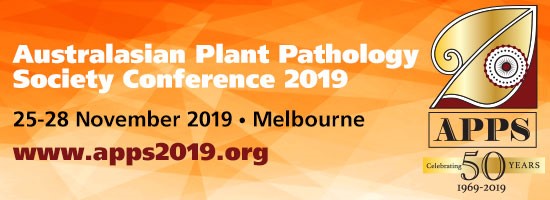
Project Leader, Organisation
Adrian Dinsdale, Australian Plant Pathology Society
Status
COMPLETE
The Australasian Plant Pathology Society (APPS) is dedicated to the advancement and dissemination of knowledge of plant pathology and its practice in the Australasian and Indo Pacific Regions. APPS has a long and successful history of promoting plant health and encouraging students to build careers in plant pathology.
Website: http://apps2019.org
A successful ‘Strong Foundations, Future Innovations’ Conference
The Australasian Plant Pathology Society’s 50th Conference ‘Strong Foundations, Future Innovations’ was a successful and well attended event, supported by the Foundation. We also supported Katharina Belt (CSIRO) attending and presenting as an Early Career Researcher; her report back to us includes the following:
“APPS was a very well organized conference. I was glad to see that many PhD students and early career scientist got the opportunity to present their work in an oral presentation as well. I feel like diagnostic and management of plant disease in the future will be regulated by prediction and modelling tools and as more data of more seasons will become available, these tools will improve as well. New solutions for pest and disease management were a big part of the conference as we are losing effectiveness of currently used methods.”
“Biocontrol offers a valuable addition to the toolbox of pest and disease management. Many currently used pesticides getting less effective as pathogens are gaining resistance over time. I think it would be important to not repeat the mistakes of the past and focus on the use of “multiple modes of action”, meaning combining different biocontrol solutions or using a biocontrol together with an effective chemical pesticide. This way use of chemicals could be reduced while at the same time overuse of one pesticide would be prevented.”
We noted with some satisfaction the number of Foundation and PBCRC-related presentations, and the following awardees:
- Prof André Drenth – Fellow of the Australasian Plant Pathology Society for 2019
- Dr Angus Carnegie – Fellow of the Australasian Plant Pathology Society for 2019
- Mark Whattam – Lester Burgess Award, Diagnostics and Extension
- Dr Rebecca Roach – Allen Kerr Post Graduate Prize
And thanks to Professor Drenth, Fellow of APPS, for the following summary:
The Australasian Plant Pathology Society (APPS) held its 22nd Biennial Conference at the Convention and Exhibition Centre in Melbourne from 25 – 28th November 2019. The Society also celebrated its 50th birthday. The theme of the conference was “Strong Foundations, Future Innovations” and the Plant Biosecurity Foundation acted as a Bronze sponsor for this event.
The congress was very well attended with 491 delegates from 30 different countries. There were 174 oral presentation and a total of 192 posters. In addition, there were 2 tours and 11 different workshops on offer on the days before and after the congress. The workshops were highly successful and very well attended. The society managed to support 37 students and early career researchers to attend the Conference with a further 11 delegates sponsored by ACIAR, the Crawford Fund and ANFIC.
The congress was very well organised with numerous keynote lectures and large numbers of excellent talks covering a wide range of issues in plant pathology. The number of different pathogen systems being under investigation is very large and vastly different approaches are used to control plant diseases. It was good to see that a wide range of traditional methods are being implemented to control plant diseases and many researchers try to incorporate selection for resistance into breeding programs. There are also several biotech solutions in various stages of development. Although it is often said that plant pathology punches well above its weight and pathologists have made a significant contribution, it would have been useful to use the anniversary of the Society to substantiate this a bit more and maybe highlight some of the changes in approach and impact of the research on plant production over the last 50 years.
It is always difficult to capture an overwhelming amount of scientific information in a few words. One common theme is the large number of different pathogens causing diseases of impact in a wide range of crops. All these stories share the fact that plant pathogens are spreading at ever increasing local and at intercontinental scale. Increases in travel and trade have led to a drastic increase in the spread of pathogens. Estimations are that that globally 40 % of plant production is lost due to pests and diseases and a large part of this occurs in the tropics. Another theme is the desire to reduce the use of Agrochemicals in plant production. Awareness of the impact of plant diseases is high among the Society members but quickly declines beyond that. A recent new word is “plant blindness” defined as “the inability to see or notice the plants in one’s own environment”. Due to urbanisation and in increased focus on technology, people in general under-appreciate the importance of plants. Clearly ongoing education is required to stress the fact that plants are the foundation for live on planet Earth. If plant blindness is an issue then the awareness that pathogens attacking plants is even further removed from the general populations list of concerns. These phenomena highlight the need for continuously raising awareness by members of the Society concerning the impact of plant diseases. I like to finalise by congratulating the APPS for organising an excellent conference.
